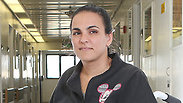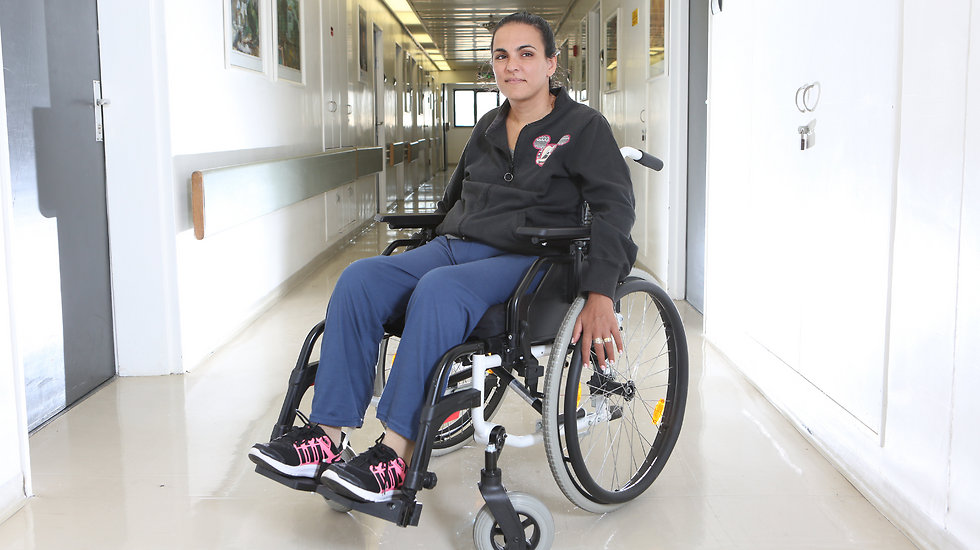
Paralyzed police officer faces her attacker in court
The wheelchair-bound Tzipi Yaakobiyan testifies against terrorist Ayman al-Kurd, who stabbed her and severed her spine; ' I have no feeling in my legs, my back, and my chest. My hands are very weak,' she tells the court.
Despite her serious condition, Yaakobiyan, 38, insisted on arriving at the District Court in Jerusalem to testify against Ayman al-Kurd, 20, a resident of east Jerusalem.
She recounted the events of September 19, 2016 behind a curtain, because she did not want to have to see the terrorist.
"I can't do most regular things, which means I'd be dependent upon others for most of my life," Yaakobiyan said in court.
She was accompanied by her family and friends, among them also police officers, who came to support her and fellow officer Koby Krudo, who was also hurt in the attack.
"I took the train to the Damascus Gate, where I met officer Koby," she recounted. "Together we made our way towards the station on Sultan Suleiman Street. Koby was walking to my left. When we reached Herod's Gate, I felt a blow and I heard a shot. I didn't see anything. I felt the blow from behind. As I was falling, I heard my name (being called out) from behind and gunfire. I saw police forces arriving. I told (another officer), 'It's a stabbing, call the paramedics.' I don't remember anything after that. I woke up at Shaare Zedek (Medical Center) after several operations."
Yaakobiyan spent several weeks in the hospital in serious condition in a medically induced coma. She told the judges of the operations she had to undergo and the ramifications of the injury, which left her paralyzed. "I have no feeling in my legs, my back, and my chest. My hands are very weak," she said.
Officer Krudo, who saved Yaakobiyan's life, also testified. "Just like every morning, I had to be at the station by 8am. I met Tzipi, and she said there was no one to pick us up, and that we had to walk to the station as we normally do. Those are hours of students (making their way to school) and I was a bit apprehensive and very alert," he recounted.
"After walking past Zedekiah's Cave, I felt more secure, but someone jumped me and gave me a painful blow to the neck. I tried to shake him off, and he let go of me. I saw Tzipi lying on the floor with a puddle of blood next to her head. I saw him (the attacker) raise his arm to stab her again, and I shot him. I was afraid to hurt her. He made a step or two toward me and I kept shooting him until he was neutralized."
'The toughest woman in the world'
Yaakobiyan, dubbed the "survivor" of the Israeli security forces, was among the most gravely wounded in the ongoing wave of terror attacks, characterized mostly by stabbings, which began in the fall of 2015.While she qualifies for 100 percent disability, her friends describe her as "the toughest woman in the world."
"This will require an enormous amount of effort, pain, sadness, stress, and mental preparation, but I'll be there," Yaakobiyan said ahead of her testimony. "I choose to be there behind the curtain. I will try to describe accurately even a little bit of what happened in the attack. He will hear me, but he won't be able to see me. I'm here so the facts are heard, and so he gets the maximum (punishment) possible."
Yaakobiyan, who was supposed to be discharged from the hospital two months ago, has been "stuck" there because the Defense Ministry has yet to find her an apartment that can meet her extensive needs.
Tzipi is wheelchair-bound and requires constant care and an accessible home with the proper facilities. Her home also has to be close to Hadassah Medical Center in Jerusalem and the Jerusalem center for disabled veterans.
The few apartments that might be able to meet her needs cost about NIS 1 million more than the family can afford, even with the aid from the Defense Ministry.
Uri Shechter, a social activists and educator who met the family at the hospital, has recently launched a campaign to raise the needed money.











